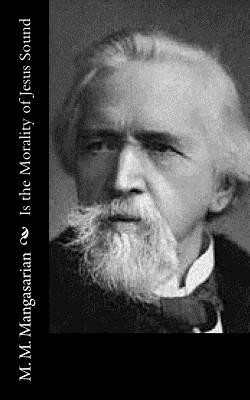
- We will send in 10–14 business days.
- Author: M M Mangasarian
- Publisher: CreateSpace Independent Publishing Platform
- Year: 2016
- Pages: 36
- ISBN-10: 1541321626
- ISBN-13: 9781541321625
- Format: 12.7 x 20.3 x 0.2 cm, softcover
- Language: English
- SAVE -10% with code: EXTRA
Reviews
Description
Excerpt from Is the Morality of Jesus Sound?
A great deal depends upon the answer to the question, "Is the moral teaching of Jesus sound?" This question brings us to the inner and most closely guarded citadel of Christianity. If it can be captured, the rout of supernaturalism will be complete; but as long as it stands, Christianity can afford to lose every one of its outer fortifications, and still be the victor. Reason may drive supernaturalism out of the Catholic position into the Protestant, and out of that, into the Unitarian, and out of that again into Liberalism, but reason does not become master of the field until it has stormed and razed to the ground this last and greatest of all the strongholds - the morality of Christianity.
If Jesus was the author of perfect or even the highest ideals the world has ever cherished, he will, and must, remain the saviour, par excellence, of the world. Whether he was man or God, which question Unitarianism discusses, is a trifling matter. If his ethical teaching is practically without a flaw, I would gladly call him God, and more, if such a thing were possible. His walking on the water, or his raising the dead, or his flying through the air, would not in the least embarrass me. I could accept them all - if he rose morally head and shoulders above every other mortal or immortal, our world has ever produced. It is claimed that he did. What is the evidence?
To facilitate this discussion, and to concentrate all our attention on the subject of this discourse, we will waive the question of the historicity of Jesus. For the sake of argument, we will accept the gospels as history - accept the authenticity of the documents, the trustworthiness of the witnesses, and the inspiration of the texts which we are to quote.
- Author: M M Mangasarian
- Publisher: CreateSpace Independent Publishing Platform
- Year: 2016
- Pages: 36
- ISBN-10: 1541321626
- ISBN-13: 9781541321625
- Format: 12.7 x 20.3 x 0.2 cm, softcover
- Language: English English
Excerpt from Is the Morality of Jesus Sound?
A great deal depends upon the answer to the question, "Is the moral teaching of Jesus sound?" This question brings us to the inner and most closely guarded citadel of Christianity. If it can be captured, the rout of supernaturalism will be complete; but as long as it stands, Christianity can afford to lose every one of its outer fortifications, and still be the victor. Reason may drive supernaturalism out of the Catholic position into the Protestant, and out of that, into the Unitarian, and out of that again into Liberalism, but reason does not become master of the field until it has stormed and razed to the ground this last and greatest of all the strongholds - the morality of Christianity.
If Jesus was the author of perfect or even the highest ideals the world has ever cherished, he will, and must, remain the saviour, par excellence, of the world. Whether he was man or God, which question Unitarianism discusses, is a trifling matter. If his ethical teaching is practically without a flaw, I would gladly call him God, and more, if such a thing were possible. His walking on the water, or his raising the dead, or his flying through the air, would not in the least embarrass me. I could accept them all - if he rose morally head and shoulders above every other mortal or immortal, our world has ever produced. It is claimed that he did. What is the evidence?
To facilitate this discussion, and to concentrate all our attention on the subject of this discourse, we will waive the question of the historicity of Jesus. For the sake of argument, we will accept the gospels as history - accept the authenticity of the documents, the trustworthiness of the witnesses, and the inspiration of the texts which we are to quote.


Reviews